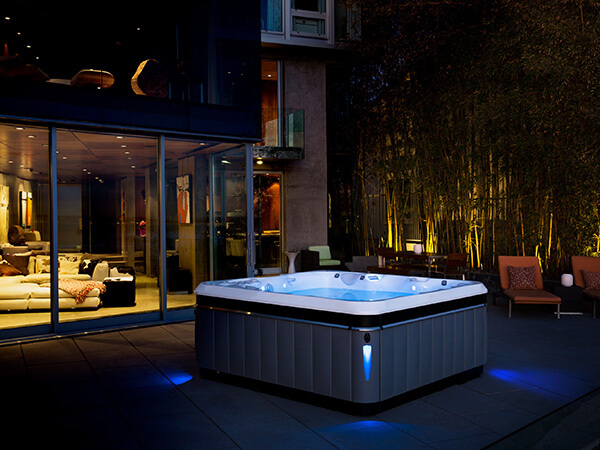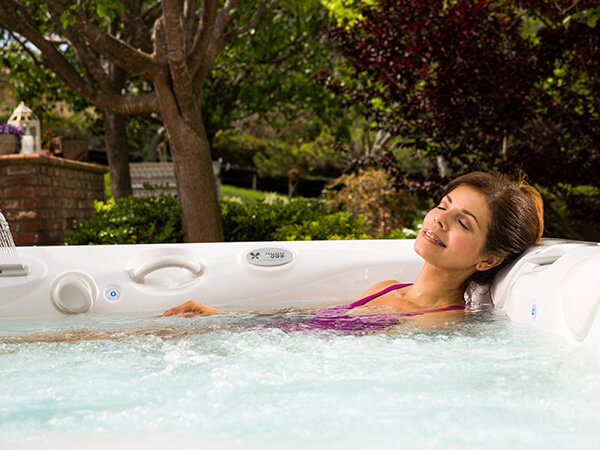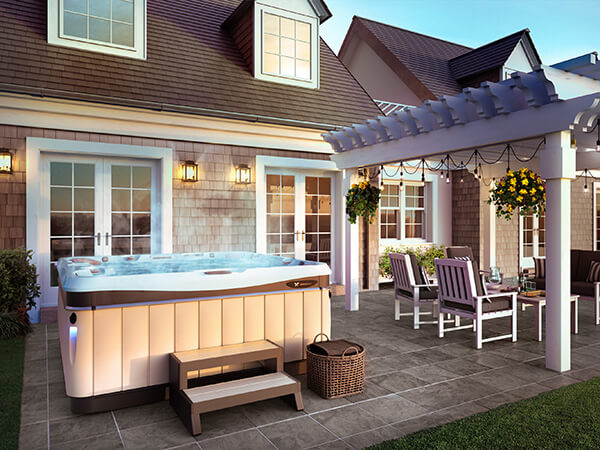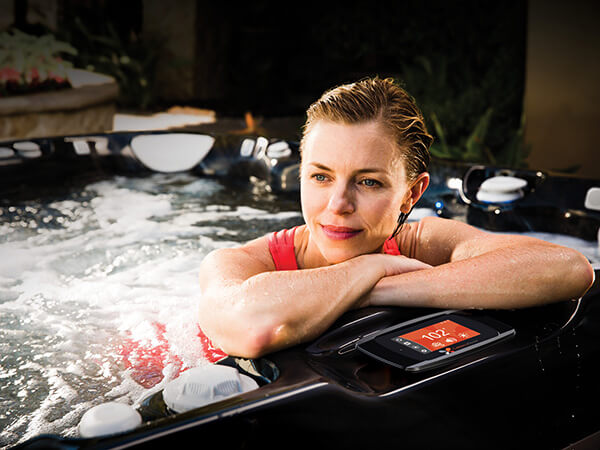Luxury hotels often advertise their top-tier rooms as Jacuzzi® Suites. But when guests check in, they sometimes find a large, jetted bathtub that was not manufactured by Jacuzzi Inc. Hotel chains, as well as retailers and consumers, often incorrectly apply the term "JACUZZI" to all hot tubs, in-ground and above-ground spas included, as well as whirlpool baths.
Jacuzzi Inc. is actually a manufacturer (and brand name) made famous after first producing air-jetted whirlpool tubs in the 1960s. The use of the brand name to define all tubs of that sort is similar to how many people today say Kleenex® when referring to any brand of tissue or Jello® when referring to all brands of gelatin.
When thinking about JACUZZI vs. a hot tub or a spa, consider the brand factor, the origins of the terminology, and the performance usage profiles and wellness benefits of the many hot tubs available today.
The Origin of the Word Spa
The word "spa" originally referred to a location of a mineral or natural hot spring. Members of ancient civilizations traveled great distances to bathe and enjoy a hot spring's restorative effects. Over time, those hot spring locations became hosts to buildings, various types of entertainment, and other diversions that offered meaningful cultural and social experiences.

Centuries later, with the advent of electricity, people no longer had to travel to a natural hot spring to enjoy a hot soak, and the term "spa" took on an additional meaning: besides being a location where a person might go to be pampered with a soak and massage, a spa came to refer to a hot tub or whirlpool bath, too.
JACUZZI vs. Hot Tub vs. Spas

In California grape-growing regions in the 1950s, people filled discarded wine vats and barrels with hot water and engineered various ways to keep the water hot. In some cases, these wine vats were quite large-able to hold 20 to 30 people. A reflection of early hot spring public bathing, the vats were communal.
Around that same time, smaller, concrete hot tubs placed beside in-ground pools became popular. These in-ground spas were suited to more intimate gatherings of friends and family, and were fairly expensive.
Also in the 50s, the Jacuzzi® brothers, who owned a company that manufactured aircraft propellers, invented a portable hydrotherapy pump that moved air. Their design allowed a regular bathtub to be turned into a jetted tub. In 1968, one of the brothers took that idea a step further and incorporated jets into the sides of the tub. The resulting integrated whirlpool tub was then patented and became the world's first true Jacuzzi® brand tub.
Today, home hot tubs have come a long way. They are simpler to install than a whirlpool tub, which can require demolishing walls and reworking your home's plumbing, and are portable- easy to move from home to home. Modern spas also offer hydrotherapy benefits to enjoy on a daily basis. These advancements are in large part due to Jeff and Jon Watkins, who built the first Hot Spring® portable spa in 1977. The Watkins brothers were forward-thinkers who went on to develop innovative hot tub features and technologies, such as full insulation, underwater lighting, and top-loading filters, that are now the standard for the industry.
Read the Watkins brothers story.
When choosing a hot tub, pick the product that brings the most comfort with the least amount of effort and that fits your lifestyle best.

The Modern Home Hot Tub
Modern home hot tubs, including Caldera® spas, are integrated, self-contained units that are easy to care for and enjoy. While water care systems vary among manufacturers, keeping spa water clean, clear, and safe requires very little maintenance. See how simple it is to keep spa water clean with a Caldera hot tub:

The benefits of hydrotherapy that a home spa provides are the same served by natural hot springs, but thanks to advancements in technology, today's hot tubs not only deliver those wellness benefits much more conveniently, but also offer more control over the entire spa experience.
Hydrotherapy Benefits:
- Muscle and pain relief. A hot tub can relieve muscle aches and pains caused by, for example, a daily fitness routine. The buoyancy of the hot water gives your muscles a break and dilates blood vessels, helping blood to flow freely and allowing you to stay limber.
- Stress relief. A hot soak can release stress and tension. Warm water releases endorphins that help you relax and let go of daily stresses.
- Deeper sleep. Enjoying your spa 90 minutes before bed can make falling asleep easier and improve sleep quality. The warm spa water elevates your body's temperature, and the cooling period afterward signals that it's time for rest.
All of these benefits are a natural extension of a home spa, but they are taken a step further in Caldera Spas by putting you in control of hydrotherapy delivery.
Intuitive controls allow you to customize your hot tub experience:
- Temperature settings. Use the control panel to choose your preference with every soak. Whether you want the penetrating heat of 104-degree water or a pleasantly warm soak at 100 degrees is completely up to you.
- Jet Pump speed. Massage jets that target different areas of the body can be turned high for intense massages or lowered for sedate relaxation.
- Entertainment choices. Optional wireless spa entertainment systems allow you to enjoy your favorite music, podcasts, or TV shows from the comfort of your hot tub. Grab the control panel and set the mood.
- Remote monitoring. With the Caldera Spas app powered by the Connected Spa Kit from Caldera, you can control your spa while you're away from home. Want to enjoy a soak as soon as you get home from work? Just set your preferences from the road. Remote monitoring is also perfect for keeping tabs on a vacation home spa.

Jacuzzi® is a brand name that is often misapplied. The brand name belongs only to air-jetted bathtubs, hot tubs, and other products produced by Jacuzzi Inc. Portable, above-ground hot tubs, such as Caldera spas, are also called spas due to the many high-quality features and hydrotherapy benefits they offer consumers. When shopping for a new hot tub, it's helpful to know the difference and that the terms are often used interchangeably.
Caldera hot tubs are recognized worldwide for quality, durability, and reliability. Discover the difference a highly respected brand name can make by taking a test soak at a dealer near you.
Read Next
